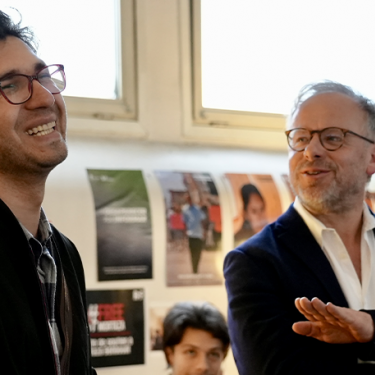Young Iranian journalist returns to Paris home after being jailed in Iran

Reporters Without Borders (RSF) thanks all those who helped to facilitate the safe return to France on 6 March of a young, Paris-based Iranian journalist who was arrested in Iran last September after going there to cover the protests for the Franco-German public service TV channel Arte.
A graduate of Lille’s journalism school, Vahid Shamsoddinnezhad arrived in Paris on 6 March on the flight from Tehran that he took after the Iranian authorities, on 5 March, finally lifted the travel ban that had been preventing him from leaving Iran since 7 February, when he benefitted from an amnesty.
Although he reported his presence to the authorities on arriving in Iran in September on assignment for Arte, he was arrested six days later in Saqqez, in northern Iran’s Kurdistan province, and was transferred to Tehran’s Evin prison, where he remained until released in November pending trial.
“I thank all the people who worked for my release and who supported my family. It gave me the courage to hold on during this difficult time. This ordeal, although painful, has not discouraged me from being a journalist. On the contrary, I am even more determined than ever to continue doing the job I love.
“We thank all those who worked for more than five months to enable Vahid to return to France, to the country where he studied journalism, where his son was born and where he now lives. The discreet and effective action taken by those involved at Arte and by the RSF team helped bring this matter to a positive conclusion. We were delighted to receive Vahid, his wife and son this afternoon at RSF headquarters, just hours after they disembarked from an Iran Air flight from Tehran. Together with Arte deputy news director Carolin Ollivier, it was wonderful to meet him and talk to him after this happy ending to a matter that caused us a great deal of concern.
After his arrest, Shamsoddinnezhad was charged with “association and collusion with intent to commit a crime against the nation’s security.” It was only on 8 November that an Iranian culture ministry spokesperson explained in a letter to Arte that he had been arrested because he had failed to notify the authorities of his intention to go to Iranian Kurdistan.
All the time he was held, Shamsoddinnezhad was allowed to speak his family for only one minute a week. He was finally released on bail on 21 November pending trial, and subject to a ban on leaving the country for six months.
His trial was held on 5 February but, two days later, before he had been notified of the verdict, he learned that he was one of the beneficiaries of an amnesty granted to mark the Islamic Revolution’s 44th anniversary. It was not until 5 March that the travel ban was lifted, eliminating the last obstacle to his return to Paris, where he has lived for the past two years.
Shamsoddinnezhad’s journalistic career began in Iran when he worked as a fixer for foreign reporters. It was this experience that persuaded him to go to France to study at the Higher School of Journalism (ESJ) in Lille.
